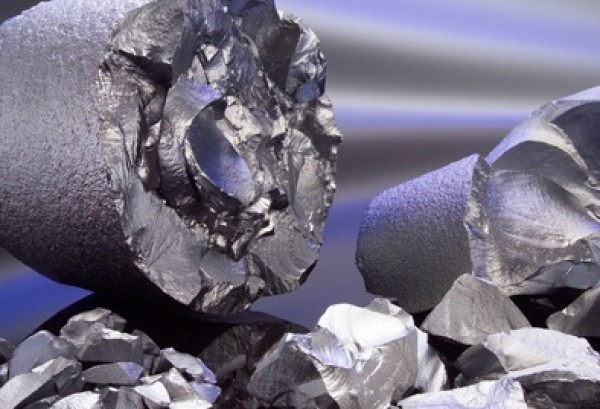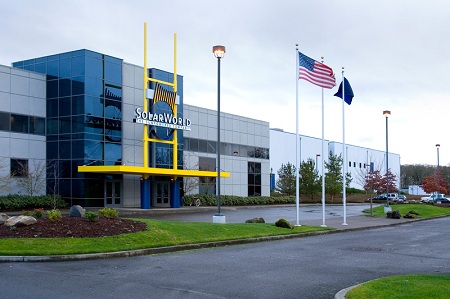China said Friday it will formally investigate imports of solar-grade polysilicon from the United States – and South Korea, too – ratcheting up the stakes in the solar trade dispute between the countries.
The Ministry of Commerce issued two orders – one an anti-dumping investigation, the other an anti-subsidy probe – in answer to what it said was evidence from several Chinese companies who said they had been harmed. U.S. firms will face scrutiny on both counts, while South Korean companies will be investigated on the charge of dumping.

Polysilicon is a key raw material for making crystalline photovoltaics, forming the wafers that are processed into energy-producing solar cells.
Earlier this year, the U.S. slapped preliminary duties totaling around 35 percent on solar cells and modules manufactured in China, citing both illegal government subsidies and dumping by Chinese companies.
The U.S. is already requiring Chinese companies to post bonds or cash deposits on their U.S.-bound solar PV, but the quasi-judicial process for enacting duties is not yet complete, with several layers of final determination necessary before an actual order would come down in November.
China said its investigation should be complete within a year, although it held out the possibility of extending it an additional six months.
While China has come to dominate the manufacture of solar cells and panels, the U.S. is a leader in the production of polysilicon. In 2010, U.S. companies – led by the Michigan-based Hemlock Semiconductor, the largest polysilicon company in the world – exported some $2.5 billion worth of the key photovoltaic component, much of it to China.
The Chinese have suggested that tax breaks for the industry have given U.S. companies an unfair advantage over Chinese producers.
Hemlock majority owner Dow Corning responded to the China action in measured terms.
“I am disappointed that the United States and China have yet to negotiate a sustainable, mutually beneficial settlement to the global trade issues that have arisen in the solar industry,” Down Corning President and CEO Robert D. Hansen said in a statement.
Hansen went on to say: “This case proves that no country or industry wins when trade disputes escalate. In China, these actions threaten the Chinese solar industry’s access to the critical technical collaboration and material supply companies like Hemlock Semiconductor currently provide Chinese solar cell and module producers. This could lead to higher costs and potentially less globally competitive solar products from China. In the United States, more than $1 billion of U.S. exports and potentially thousands of U.S. jobs across the solar value chain are at risk – as is the steady growth of the U.S. solar industry.
The trade fight is but one piece in a complex political-economic drama playing out in the solar industry. A big run-up in production capacity has created immense oversupply, despite the fact that solar installations continue to grow. Solar PV prices have been plunging worldwide, down 50 percent last year and another 20 percent this year.
Companies around the world have been suffering. Several German companies have failed, and earlier this month, Abound Solar, the recipient of a U.S. loan guarantee, declared bankruptcy, while General Electric put the brakes on development of a big new solar factory in Colorado.
A coalition of U.S.-based companies, under the banner Coalition for American Solar Manufacturing and led by the U.S. unit of Germany-based SolarWorld, says China is largely to blame for the carnage. The Commerce Department, responding to complaints the group filed last October, has backed the claims of unfair practices.
CASM head Gordon Brinser, fromSolarWorld, on Friday called the polysilicon investigation “a common Chinese tactic and an abuse of international trade rules.”

“It represents yet another cynical attempt by the Chinese government to bully the U.S. government by injecting politics into a judicial investigation that is sanctioned under international trade rules, as today’s announcement tacitly confirms,” Brinser said in a statement. “Fortunately, when the Chinese government has attempted such blatant retaliatory actions, its actions have been declared illegal by the World Trade Organization.
But that push to punish the Chinese has split the U.S. industry, with installers and others in the solar supply chain, organized as the Coalition for Affordable Solar Energy, fearful that duties will crimp the ongoing solar boom. That group reacted quite differently to China’s announcement.
“Looking at the preliminary tariffs set in the U.S. it’s clear that the free flow of solar goods is already disrupted, prices are increasing, jobs are being eliminated, and businesses are adversely impacted at every level of the global solar industry,” CASE President Jigar Shah said in a statement. “We urge all countries to avoid unilateral actions that impede trade and resolve conflicts in a bilateral or multilateral context. Specifically, we urge the U.S. and China to rise above SolarWorld’s selfish action and engage in productive dialogue to prevent this destructive trade war. Lowering, not artificially raising, the cost of solar should be a global goal.”